The world of online learning has grown exponentially in recent years, with a myriad of options for both online students and educators.
The online course platform you choose is integral to the success of your business – affecting student experiences, backend processes, and all other components of course creation and delivery – and it needs to grow alongside you. Too many course creators find that the platform they begin with isn’t the right one when it comes time to scale.
The best online course platform will allow you to build your business long-term, offering both comprehensive course creation tools and marketing functionalities. Read on for a list of the 19 top online course platforms educators should be aware of and the key features to have in mind.
What exactly is a membership website platform?
Many online educational platforms have overlapping terminology, but there are a few distinct types of software to understand:
Massive Open Online Course (MOOC): This type of platform educates large numbers of online students on a wide range of subjects. Not intended for independent course creators, a MOOC (such as Udemy or Skillshare) is its own platform with its own member base. Educators upload either paid or free courses to these platforms for online learners to access.
Learning Management System (LMS): A learning management system integrates more administrative tools than an online course platform. Used primarily by schools or businesses, an LMS facilitates online classwork and training programs. Popular learning management systems include Canvas, Google Classroom, and even WordPress LMS plugins like Learndash.
Online Course Platform: An online course platform is software that enables independent course creators and entrepreneurs to create, publish, and sell their educational content online.
Top online course platforms
Best Overall Choice: Kartra
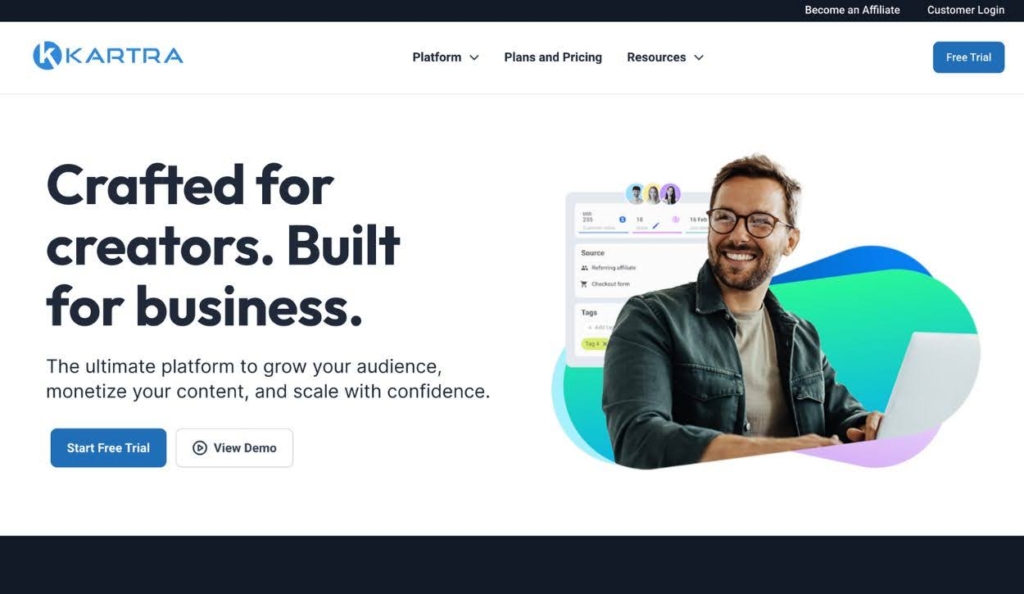
Kartra’s all in one course creation and marketing platform comes with extensive features ideal for scaling your online business. Kartra provides course creators with both a comprehensive course builder and digital marketing platform, making the best use of your time and budget. Distinctive benefits of Kartra include:
- Ability to sell both physical and digital products
- Wide range of native features means minimal dependence on external integrations
- Access to a robust page and form builder
Business owners can sell unlimited courses through Kartra and promote both physical and digital products with Kartra’s full slate of marketing functionalities – including advanced sales funnels and intuitive email marketing automation tools. And unlike most other online course platforms, Kartra offers a significant number of native features so business owners don’t have to pay for and manage a stack of third-party integrations or tools like Zapier. From native video and webinar hosting to a built-in helpdesk feature, Kartra is intended to be a truly comprehensive course creation platform.
Podia
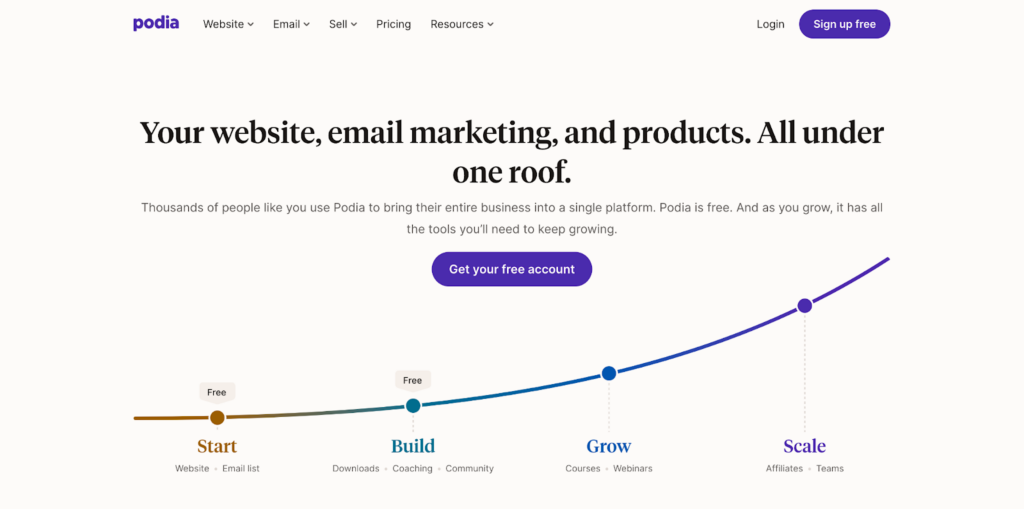
Podia offers course creators a bit of everything. This basic all in one course platform enables you to build a website, create a course with a variety of media formats, and send emails to your member base. With affordable basic plans, Podia can be a good place to get started.
While Podia offers users a broader range of features than generic course creation platforms, their functionalities are limited compared to other all in one platforms. For example, Podia’s email marketing functionalities don’t include advanced workflows and their basic page builder has minimal customization opportunities. Course creators trying to scale their business with Podia will likely need a variety of third-party integrations to execute a robust marketing plan.
Kajabi

Kajabi is a course creation platform with a decent size list of course creation features. Kajabi users appreciate the resources available for learning how to use the platform and the access to customer support that comes with it. Kajabi features include Kajabi Community, the Kajabi mobile app, and a blog builder.
The major downside to Kajabi is the absence of key features that would require paying even more for third-party integrations. For example, course creators neither have access to native video and webinar hosting in Kajabi, nor can they guide students to a native helpdesk for course support. Kajabi can quickly become an expensive choice when you need to scale your business but still have to maintain a list of integrations.
Teachable

Teachable is a course creation and delivery platform that enables independent course creators to create, publish, and sell courses – building an online business from scratch. Teachable offers a variety of affordable paid plans along with a free version and is best suited to entrepreneurs getting their course creation business off the ground.
The downside of Teachable is that it comes with only the basics. Simple design and template options limit brand customization, basic analytics restrict customer insights, and the streamlined slate of features requires additional integrations as your business grows. Many users find that their budget ultimately goes further with more comprehensive platforms like Kajabi or Kartra.
Thinkific
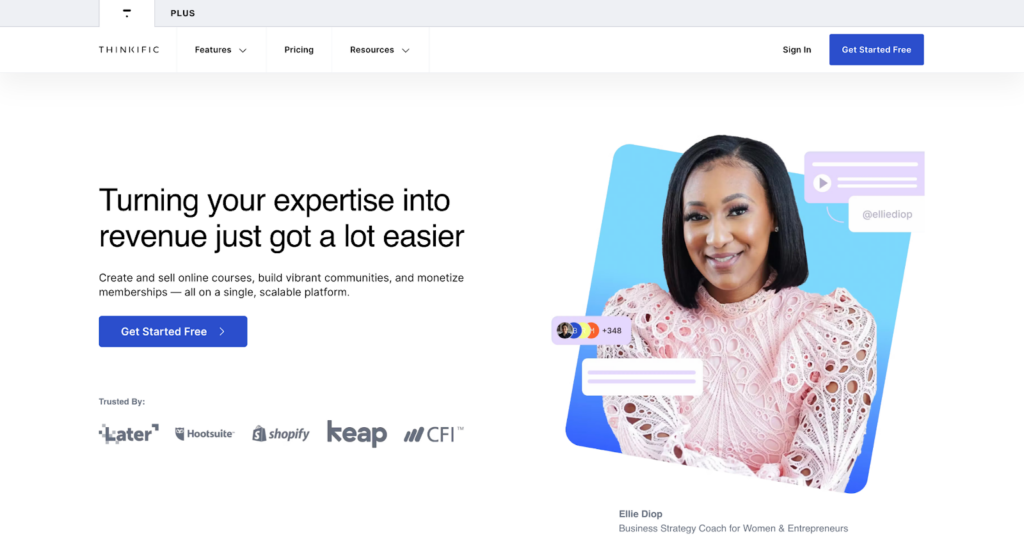
Similar to Teachable, Thinkific is an online course platform best suited to creators in the beginning stages of entrepreneurship. Thinkific is a lower-cost platform compared to many other alternatives, letting course creators get started with a free plan.
The primary disadvantage of Thinkific is its basic feature options. Thinkific’s page builder, for example, has minimal design options, only basic templates to choose from, and limited customization opportunities. And without marketing features, Thinkific can quickly become an expensive option when paired with multiple integrations for webinars, affiliate management, and other key components of an online course business.
Udemy
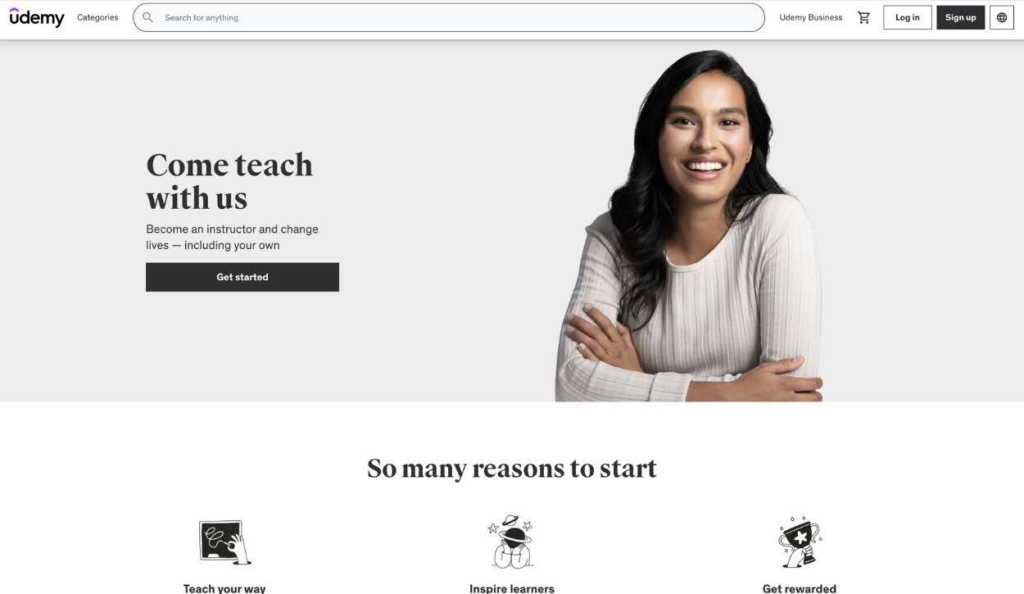
Udemy is a massive open online course (MOOC) website with a marketplace model. Beginner or experienced educators can upload their courses for free on Udemy and receive a portion of the profits when students find and purchase their e-learning materials. This type of online school can work well for new course creators who want to join a platform with an existing audience, instead of building an online course creation business from scratch.
The major downside of Udemy is that it is not conducive to personal brands or to scaling your business as a course creator. Similar to a search engine, Udemy is a competitive marketplace – some courses will see significant traffic and high profits, while others will go relatively unnoticed.
Coursera

Like Udemy, Coursera is a massive open online course platform (MOOC) where educators upload course materials and receive a portion of the profits when students purchase their course. Unlike Udemy, Coursera is rigorously academic and selective in who can publish courses on their online learning platform. Coursera only partners with certain companies and higher education institutions. This platform offers a unique opportunity for subject matter experts who work for partner institutions, but it’s not built for independent course creators or entrepreneurs.
LearnWorlds
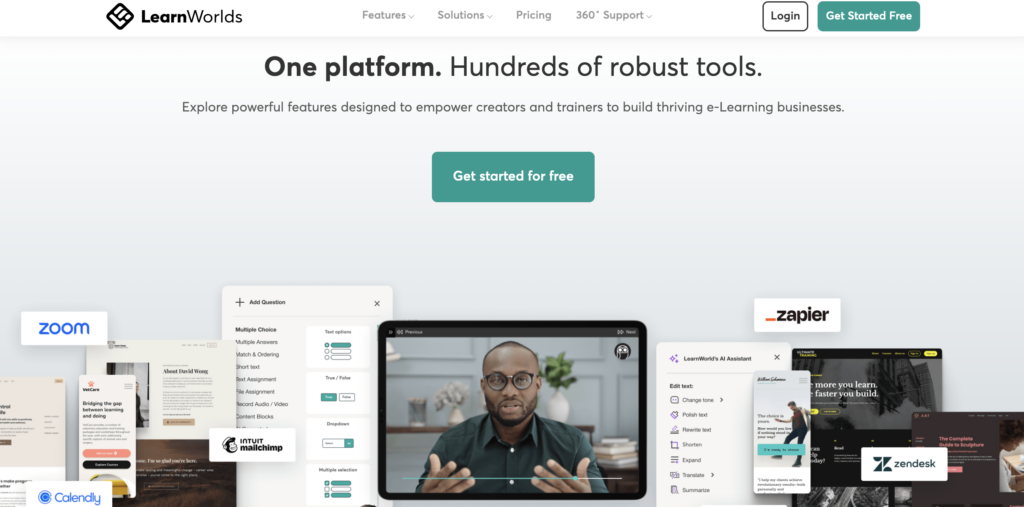
LearnWorlds is a robust online course platform with offerings for both new and seasoned course creators. It positions itself as an “AI-powered” suite of tools for course creation, delivery, and marketing.
Its interactive video features, one of the most popular LearnWorlds features, lets course creators ask questions, add pointers and popups, and CTA elements directly into course videos to boost student engagement.
With LearnWorlds, course creators have professional-looking courses that incorporate various content types, including e-books, SCORM files, and even customizable certificate templates.
Additionally, the platform offers users an “app builder” that helps users create native iOS and Android apps where users can download courses and other offerings seamlessly on their mobile devices.
While LearnWorlds excels in many areas, some users find its email marketing capabilities somewhat limited compared to more comprehensive platforms like Kartra.
Skool
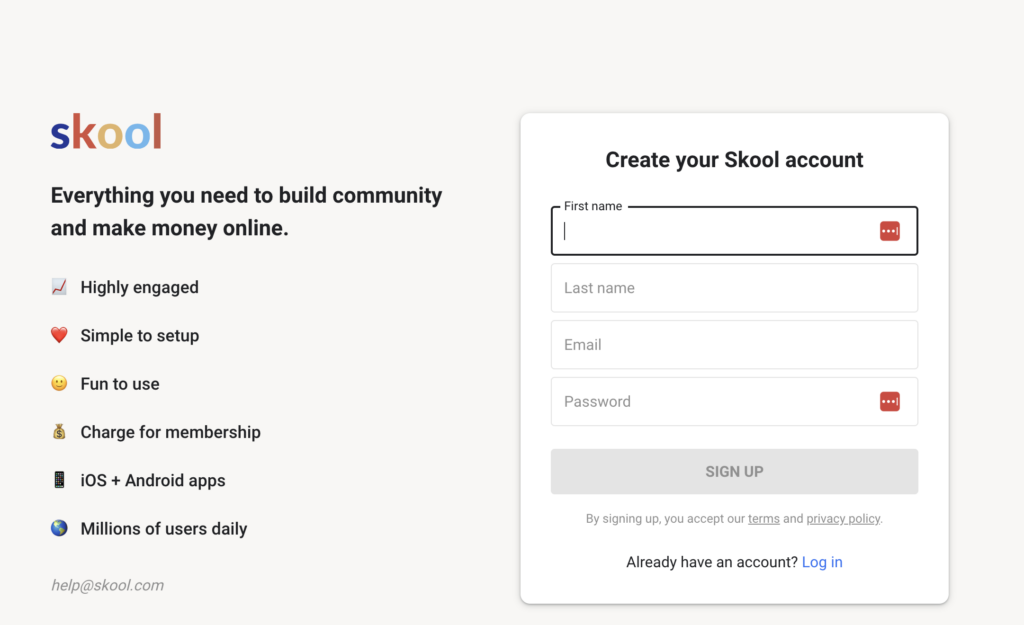
Skool carves out a unique niche by emphasizing community-building alongside course delivery. This innovative platform is tailored for course creators who prioritize student interaction and peer-to-peer learning, fostering engaged communities around their educational content.
At the heart of Skool’s offering are its intuitive community management tools. Course creators can effortlessly set up discussion forums, live chat rooms, and even host virtual events within the platform. This focus on community is unique in the course platform sector.
Skool’s course creation tools are very basic compared to some other platforms. While it supports various content types, including videos and PDFs, it lacks some of the advanced customization options found in platforms like Kartra or LearnWorlds. Course creation, support, and marketing features are significantly limited compared to most other course platforms.
Nevertheless, Skool’s powerful community features and user-friendly design make it a compelling choice for educators looking to build a loyal student base and facilitate ongoing discussions around their course content.
Mighty Networks
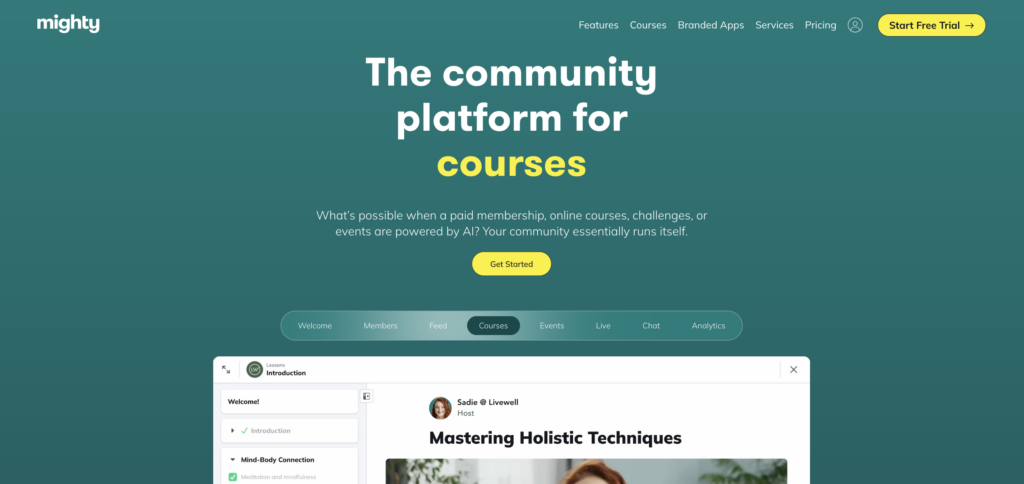
Mighty Networks is a blend of course creation software and robust community-building features. With Mighty Networks, educators can create courses, host discussions, create groups and subgroups, and even run live events within a branded digital space.
This combination makes it ideal for course creators aiming to build an ecosystem around their educational content rather than only delivering standalone courses.
When it comes to marketing features, Mighty Networks has very few. Rather, it has integrations available with many popular 3rd party tools.
New Zenler
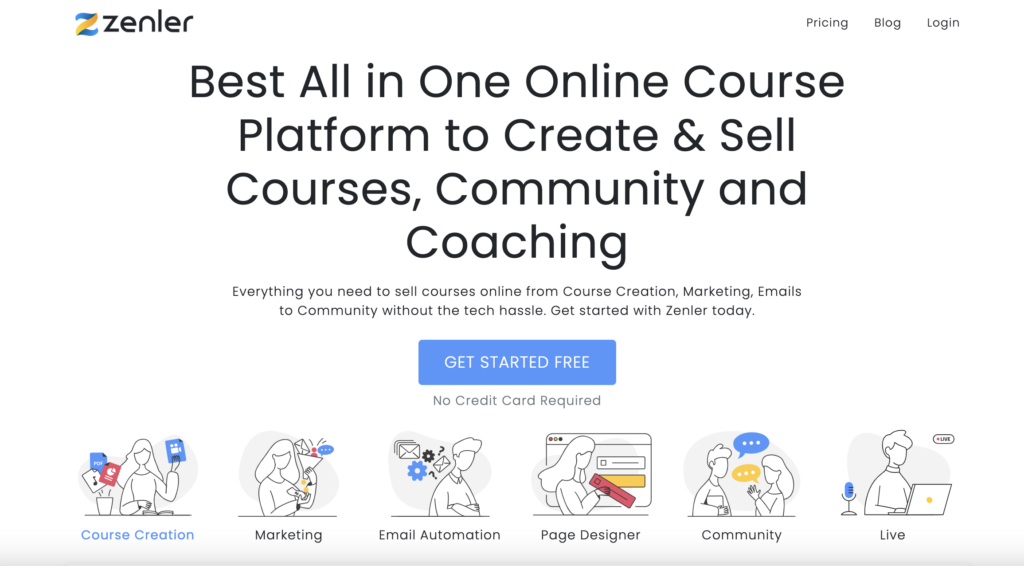
New Zenler bills itself as an all-in-one course creation and marketing platform, aiming to provide course creators with every tool they need under a single roof.
The platform’s intuitive course builder is a highlight, allowing educators to create professional-looking courses with a user-friendly drag-and-drop interface. New Zenler supports videos, quizzes, and assignments. To boost student engagement and motivation, the platform incorporates built-in gamification features, such as progress bars and achievement badges.
When it comes to marketing, New Zenler doesn’t disappoint. It provides a robust set of tools, including funnel builders, email marketing automation, and affiliate management. This comprehensive approach makes it a strong contender for course creators who want to handle both course delivery and marketing within a single platform. However, it’s worth noting that while New Zenler offers a wide range of features, some users find that the depth of certain functionalities may not match that of more specialized platforms. Despite this, New Zenler’s all-in-one approach and competitive pricing make it an attractive option for many course creators, especially those looking to consolidate their tech stack.
FreshLearn
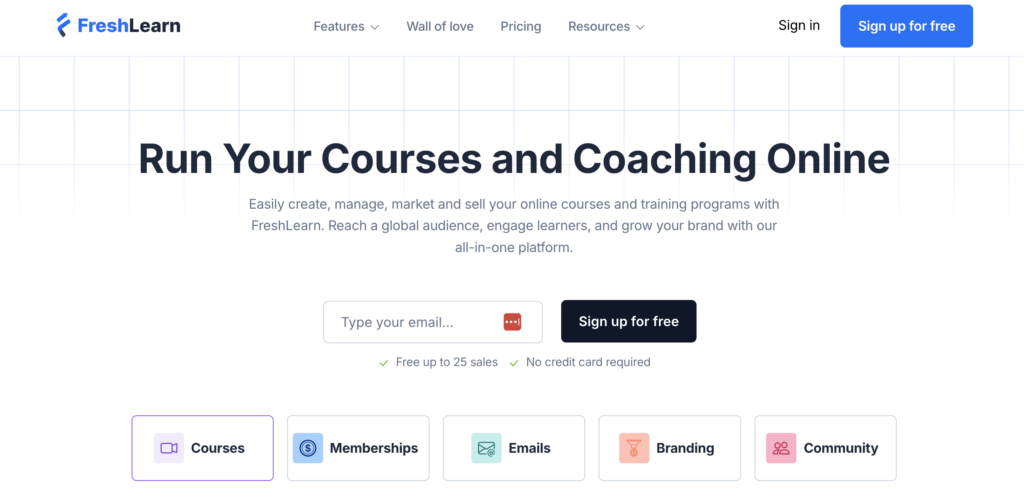
As a newer option in the online course platform market, FreshLearn has quickly made a name for itself by focusing on providing a straightforward, user-friendly experience for both course creators and students.
There are two unique features of FreshLearn that stand out from the rest: First, FreshLearn’s AI-powered course creation assistant is a game-changer for newer educators who need a boost. The tool can structure course content, suggest areas for improvement, and generate course outlines based on a given topic. For first-time course creators or those looking to streamline their course development process, this feature can be invaluable.
Second, it has a blogging CMS where users can post articles and other content. This can help them drive organic traffic via SEO without having to rely on an outside tool or WordPress website to handle their written content creation.
FreshLearn offers a range of other tools, including live webinars, discussion forums, and progress tracking. While its marketing features may not be as extensive as some other all-in-one platforms like Kartra, FreshLearn does provide basic email marketing and landing page creation tools.
WizIQ
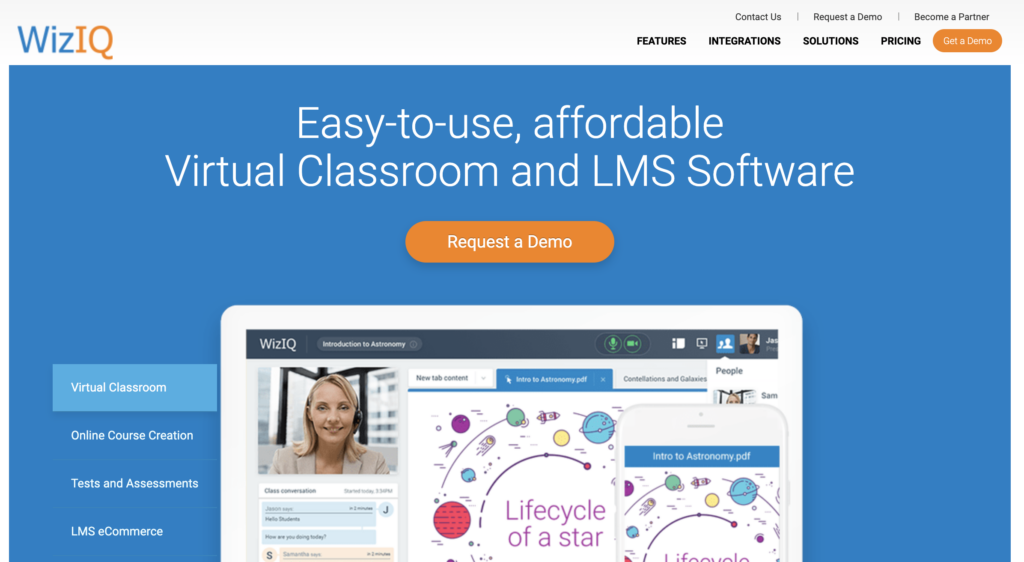
WizIQ serves educational institutions and offers individual course creators tools to host their courses. The platform focuses on live, instructor-led training, which sets it apart, making it particularly suitable for professional educators who need real-time interaction with their students.
It boasts high-quality video streaming, quiz and testing creation, interactive whiteboards, and screen-sharing capabilities, facilitating engaging live sessions.
On the administrative front, WizIQ equips educators with comprehensive learner management tools. These include detailed analytics and automated test creation and grading features. While the platform does offer some marketing capabilities, such as course landing page creation, it lacks many marketing features found in other platforms and its UI is very dated.
Academy of Mine
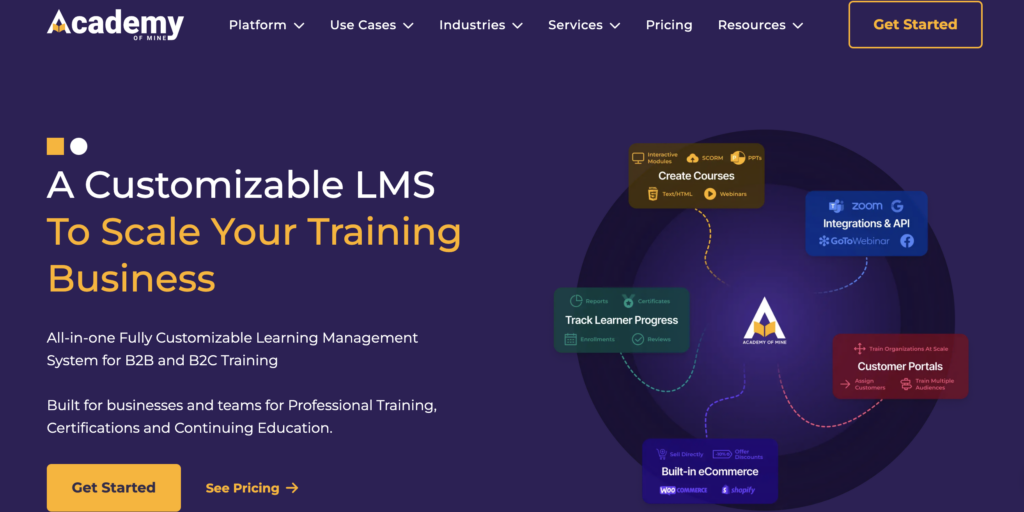
Academy of Mine is a highly customizable learning management system (LMS) tailored for businesses and organizations looking to create online training programs. It markets itself towards B2B companies and higher education institutions.
Academy of Mine’s advanced course builder allows for the creation of multi-tiered courses with prerequisites and custom learning paths, making it particularly suitable for developing professional certification programs or corporate training courses. Additionally, the platform offers robust assessment tools, including the ability to create branching quizzes and surveys.
Academy of Mine relies on integrations for most of its marketing features. If you’re looking for customization and personalization, the company offers a service that will design your eLearning website or customize its LMS to match your needs.
Skillshare
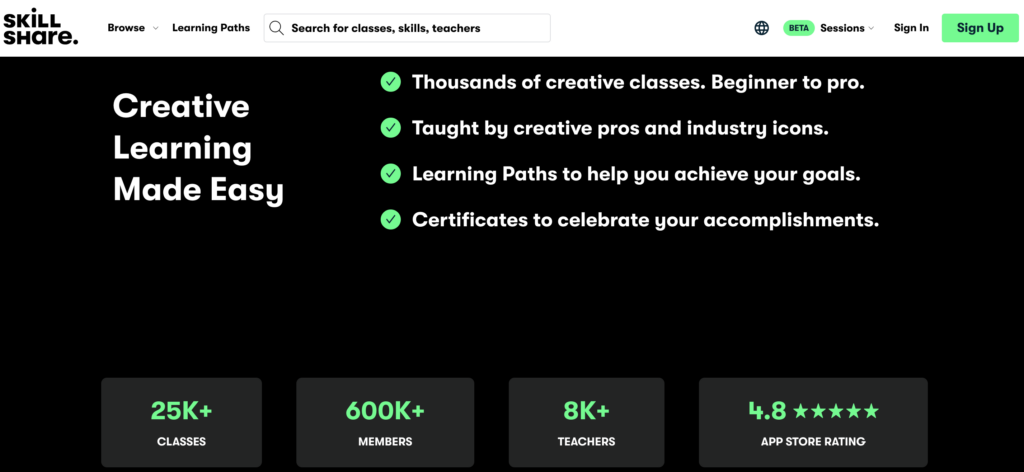
Skillshare is a marketplace and online learning community focused solely on creatives and entrepreneurship. Unlike platforms designed for independent course creators to build and sell their own courses, Skillshare operates on a marketplace model similar to Udemy. This approach makes it best suited for educators looking to tap into an existing audience of learners interested in creative and business skills.
For course creators, Skillshare offers a straightforward course creation process and handles all aspects of payment processing and student management. It’s worth noting that educators must be approved to create courses on its platform. Creators also have less control over pricing and marketing than platforms like Kartra or Teachable. Skillshare’s revenue-sharing model, where instructors earn money based on the watch time their classes accumulate, can be lucrative for popular instructors but may pose challenges for new educators trying to stand out in the crowded marketplace.
Ruzuku
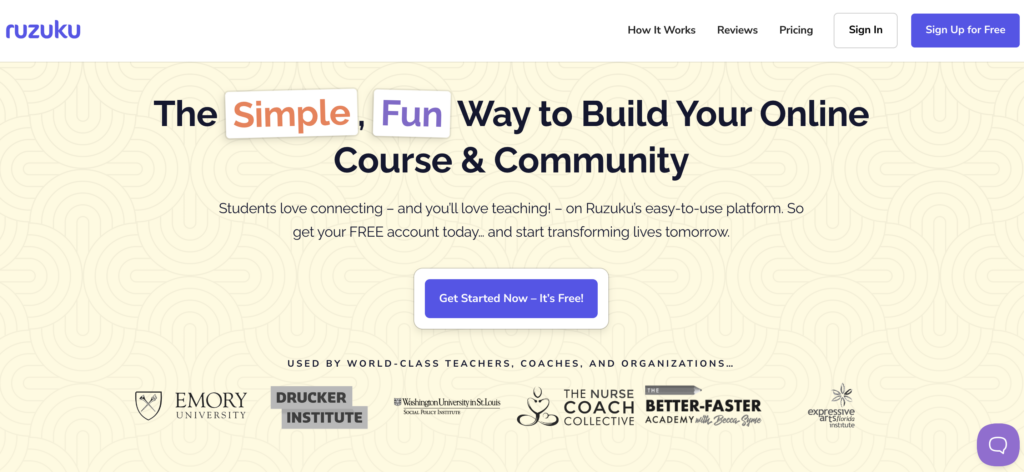
Ruzuku has built its reputation on simplicity and ease of use in the online course platform space. The platform is designed to make course creation and delivery as straightforward as possible, making it an excellent choice for first-time course creators or those who prefer a no-frills approach to online education.
A key feature that sets Ruzuku apart is its course creation wizard. This tool guides educators through the process of setting up their course step-by-step, proving particularly helpful for those new to online course creation. The platform also has discussion features that facilitate easy interaction between instructors and students, as well as among students themselves.
In terms of marketing, Ruzuku provides basic tools, including the ability to create sales pages and coupons and offer free trials. It also integrates with popular email marketing services, allowing course creators to build their email lists.
Teachery
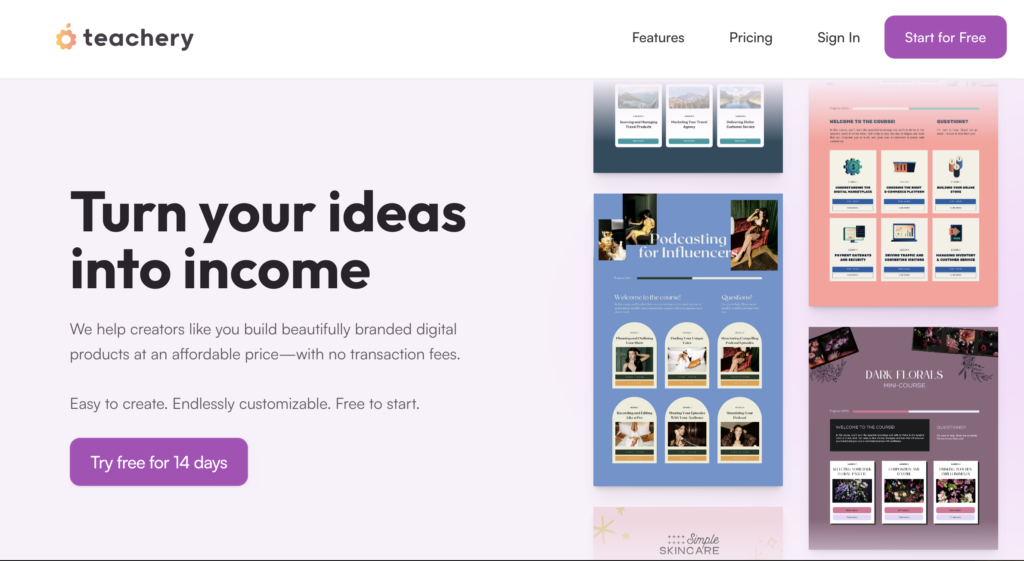
Teachery caters to newer course creators who prioritize getting their content online quickly without grappling with complex features or steep learning curves.
A distinctive feature of Teachery is its unlimited courses and students model, available even on its basic plan. This makes it particularly attractive for educators planning to create multiple courses or expecting a large student base. The platform also offers a unique course duplication feature, enabling creators to easily replicate and modify existing courses.
Teachery provides basic customization options for course pages and a simple drag-and-drop course builder. While its feature set may not be as extensive as some other platforms, it covers the essentials, including drip content, basic analytics, and the ability to create landing pages. The platform’s simplicity can be both a strength and a limitation – while it’s easy to use, more advanced users might find it lacking in some areas. However, for course creators who prioritize getting their content online quickly and affordably, Teachery can be an excellent choice.
ClickFunnels

Considered by many to be the OG of course platforms, ClickFunnels currently positions itself as a complete marketing and sales funnel builder that happens to excel at hosting and selling digital products, including online courses. This makes ClickFunnels an attractive option for course creators who prioritize digital marketing and sales strategies alongside content delivery.
It features many items other platforms offer, including an intuitive drag-and-drop funnel builder, landing page builder, and robust email marketing. This allows course creators to design complex sales funnels using landing pages, order forms, upsell pages, and membership areas, all within a single, cohesive system.
It’s worth noting that in recent years, ClickFunnels has not kept up with the pace of innovation in the course platform space. Its course features are scarce compared to dedicated online course platforms. The membership area, where courses are typically hosted, offers standard features like drip content and progress tracking. However, it lacks some of the more advanced learning tools found in many other platforms.
AccessAlly
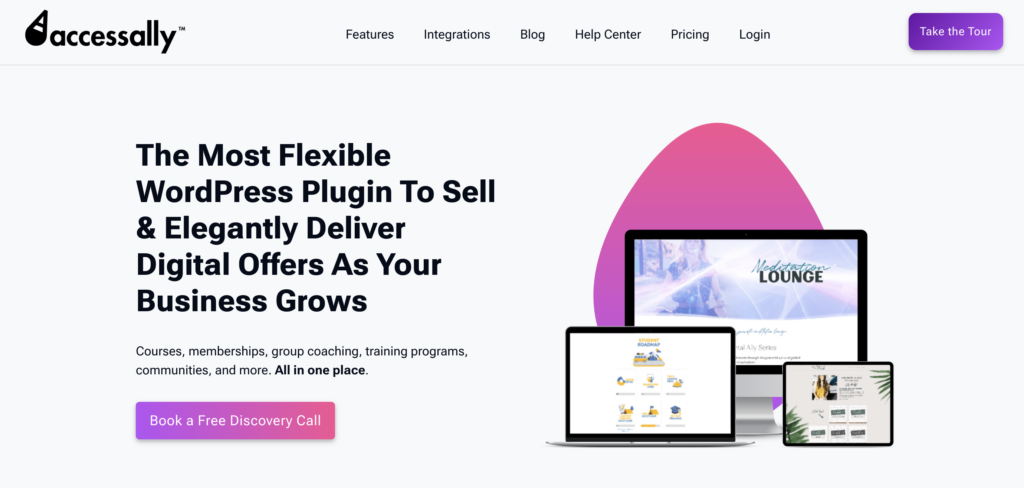
AccessAlly is an LMS WordPress plugin designed for creators who want complete control over their course websites, including design and functionality. The platform offers advanced quizzing options, including personalized quiz questions based on user responses and a ‘homework submission’ feature allowing direct instructor feedback. These tools can significantly enhance the learning experience, making AccessAlly an excellent choice for educators offering in-depth, interactive courses.
AccessAlly also excels in its membership management capabilities. The platform offers flexible options for structuring memberships, including the ability to create complex access rules and even set up ‘unlock’ conditions based on course progress or quiz results.
AccessAlly’s WordPress-based nature means it comes with a steeper learning curve compared to all-in-one platforms. While this means greater flexibility and control for creators, it may require more technical know-how or resources to set up and maintain. For course creators willing to invest the time, AccessAlly can provide a highly customized and powerful course delivery system.
Key features to look for in an online course platform
A standalone course platform should go beyond basic course creation features, enabling educators to build a truly professional experience for their members and to successfully market their courses to new students. Many course platforms have the necessities for starting an online business, but not scaling it. Read on to learn the main features course creators should look for in a comprehensive online course platform – from quality content development functionalities to robust marketing tools.
Professional Landing Page & Form Builder
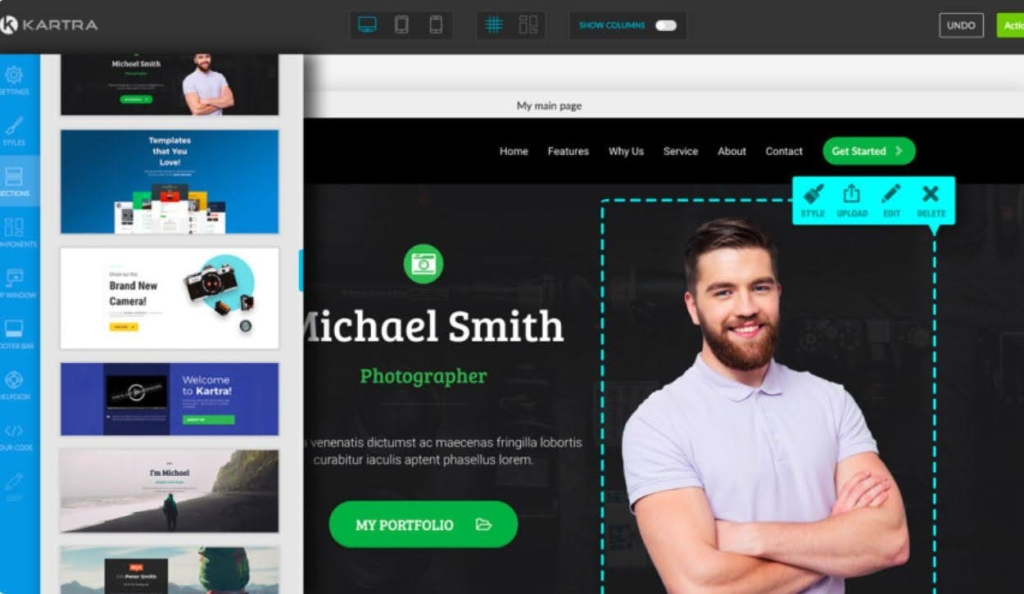
Kartra offers a comprehensive suite of tools for digital marketers and entrepreneurs, including a powerful landing page builder and form creation software. The platform boasts an intuitive drag-and-drop editor that allows users to create visually appealing and conversion-optimized landing pages without requiring coding skills. With a vast library of professionally designed templates, users can quickly customize and launch pages that align with their brand identity.
The form builder complements this by enabling the creation of tailored fields and versatile form types, from embedded forms to pop-ups, all designed to capture leads effectively.
Checkout Page Considerations
Every ecommerce platform will include a checkout page for when your customers are ready to make a purchase. Take note of the payment gateways available (Stripe, Paypal, etc.) and if there are any transaction fees. There are also significant differences between platforms’ checkout customization options. For example, Kartra’s checkout page builder enables easy upsells, downsells, and last-minute add ons to help close sales. Make sure the checkout page builder you choose works well for your pricing model and member base.
Customizable Quizzes & Surveys
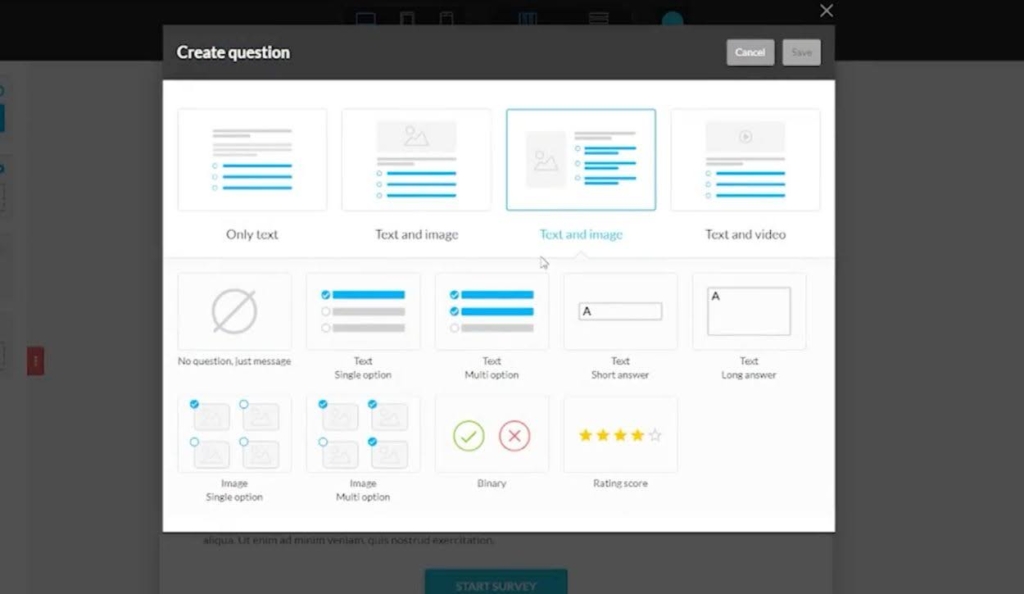
Student quizzes are another standard feature of most course platforms, but it matters whether you are stuck with generic forms or given a range of customization options. Kartra’s quiz maker lets educators add as many questions as they need and choose from these eight variations:
- single-option text
- multi-option text
- short text answer
- long text answer
- multi-option image
- single-option image
- binary (“yes” or “no” answers)
- rating score (rate up to 5 stars)
Use these detailed assessments to direct learners to appropriate membership levels, auto-tag students based on their answers or test scores, and guide them to a personalized success page with a course completion certificate. The possibilities are endless. And don’t forget to leverage surveys and quizzes for marketing and course development purposes. Keep your finger on the pulse of your audience by creating dynamic, sophisticated surveys for your leads, customers, and prospects.
Native Video & Webinar Hosting
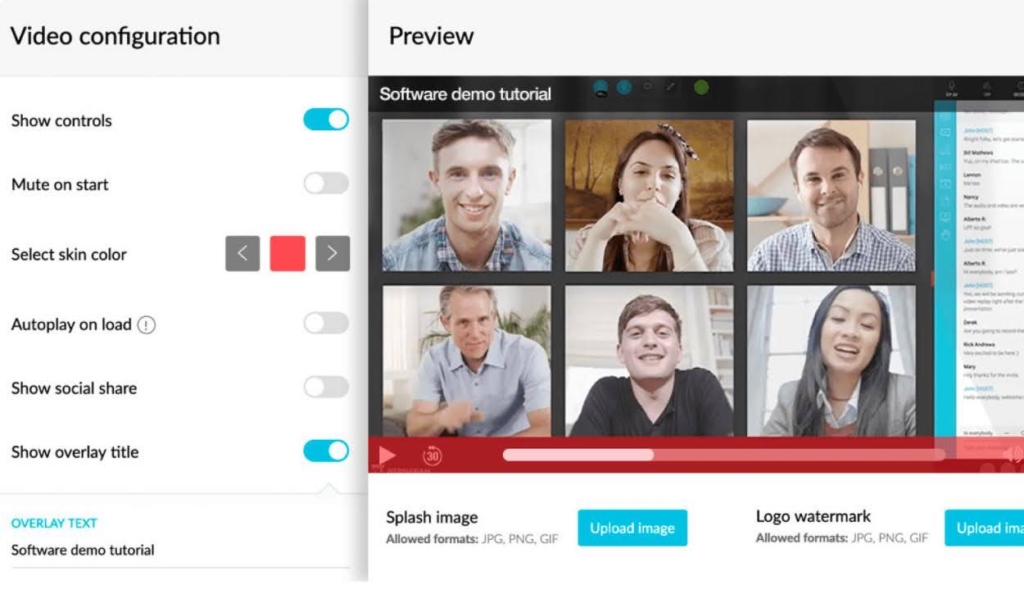
Videos and webinars are essential components of course creation – both for marketing efforts and student education. With integrations like Zoom or Wistia, most course creation platforms will allow you to upload and display video content for your students, such as welcome videos or tutorials. But native video and webinar hosting capabilities are extremely helpful for maximizing your budget and integrating video with your sales funnel and membership management system.
For example, Kartra allows course creators to add interactive marketing elements in their video courses such as pop-ups with important offers. Internal video tracking also enables educators to understand how their students engage with course content beyond the basic analytics available in any video software. It’s much easier to incorporate videos and webinars into your sales funnel and into your students’ overall experience when you can upload and host videos (and playlists) natively.
Advanced Email Automation
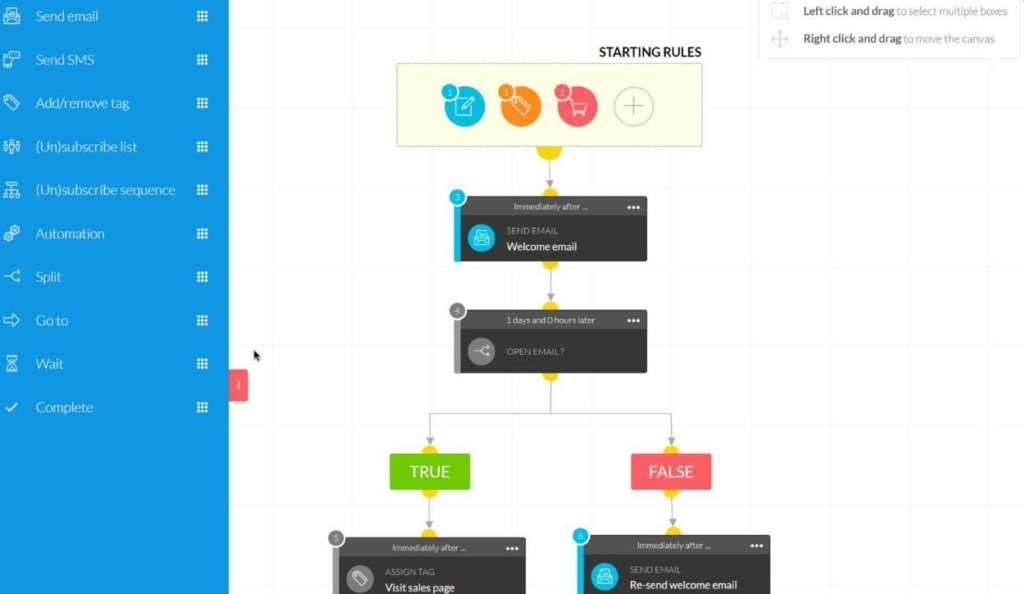
Scalable email automation is a necessary part of growing your online course creation business. Automated email sequences drip content that builds customer relationships, boosts enrollment, and reminds your audience base why your brand is so valuable.
While third-party email software like Mailchimp can be integrated with most course creation software, native email capabilities minimize increasingly expensive third-party platforms. Native email also means business owners can seamlessly integrate email communications with sales funnels, member analytics, and the course website. Choose a course creation platform that doesn’t just accommodate email marketing, but actively facilitates it.
Automated Workflows & Sales Funnels
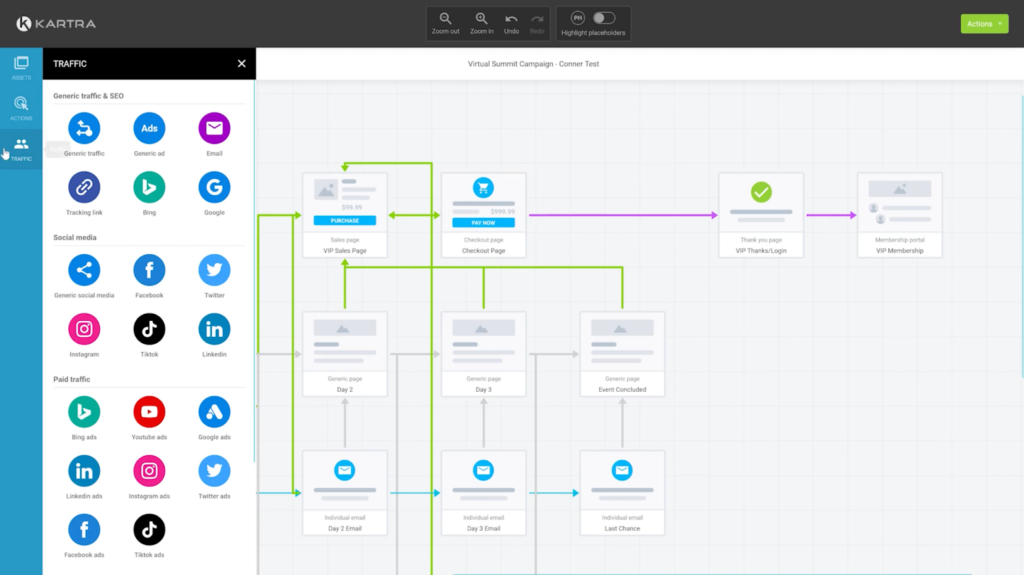
Automated sales funnels are features you’ll only find in comprehensive course platforms like Kajabi or Kartra. And even when it comes to all in one online course platforms, there are differences in how complex your sales funnels can be and how many user-friendly templates are available.
Kartra offers course creators a wide selection of professionally designed, plug-and-play marketing campaigns – and a whole marketplace to browse if you need more options. Kartra users appreciate the uniquely high level of customization available through Kartra campaigns – including a host of behavior-based automations, intelligent split testing, conditional rules, and auto-tagging.
Comprehensive Membership Management
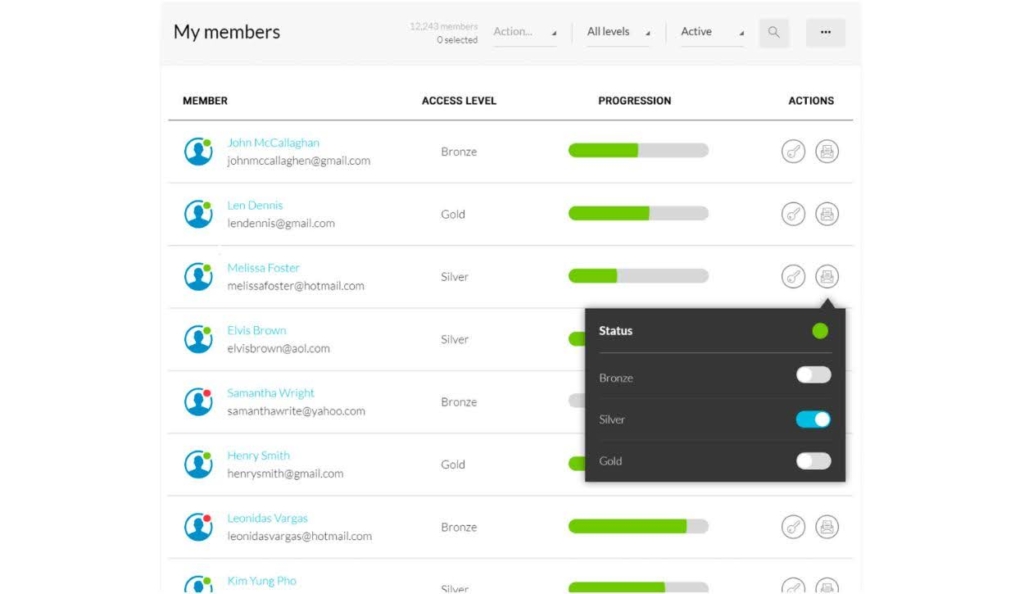
Membership management software is a must-have for course creators whose business relies on membership tiers, subscriptions, student cohorts, or any other pricing model besides a simple one-for-one transaction. And as your online business grows, it will only become more complicated to monitor and improve member experiences without membership site features built into your course platform.
Kartra Memberships is designed to simplify business processes and give your students a professional experience with your course. Whether moving up membership tiers, submitting a ticket to your helpdesk, or answering a survey, it should be straightforward for members to engage with their online learning experience. And it should be simple for you to track student progress to make sure your users are on the right track for success.
Learn about 6 Membership Site Pricing Options for Course Creators
Affiliate Program Management

The beauty of affiliate marketing as a course creator is that your network of possible affiliates grows with each student you enroll. Affiliate programs enable you to leverage the satisfaction of your most successful students into a profitable partnership. As affiliates bring qualified leads to your online business, they are compensated for their efforts and you expand your member base without investing in costly, less effective sales tactics.
Third-party affiliate programs can be integrated into almost any course platform you choose, but a native affiliate management system significantly streamlines this process. You should be able to onboard, track, and pay affiliates in the same place you manage the rest of your member base. This helps ensure no one falls through the cracks and gives you a better birds-eye view of business operations. Plus, a native affiliate program removes the need to pay an ongoing subscription fee to yet another software provider.
Lead Management Software
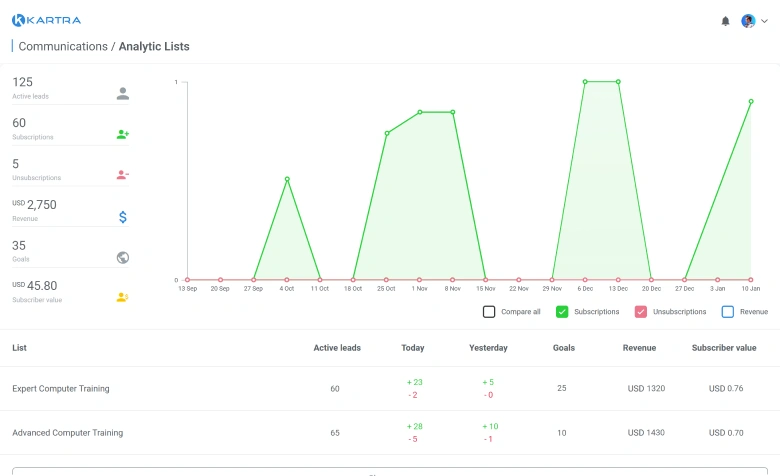
Kartra provides a robust lead management system that functions as a Customer Relationship Management (CRM) tool. It allows users to track the journey of each lead, gathering crucial insights into user behavior and validating marketing strategies.
The CRM features custom tagging and lead scoring capabilities, enabling businesses to segment their audience and automate personalized marketing actions. With the ability to import existing contacts and integrate lead management seamlessly with sales funnels, Kartra aims to offer a unified platform for managing customer relationships and optimizing the sales cycle.
Holistic Data Analytics

Analytics come with every type of online software – whether video marketing, email automation, or an online course creation platform. But each platform you utilize will have its own dashboard and reports to be integrated and cross-applied throughout your software stack. An all in one platform consolidates course delivery and digital marketing analytics to improve your decision-making and brand messaging.
Course creators should be able to monitor the entire student lifecycle – from the first time a contact receives a digital download lead magnet via email to their most recent membership renewal. This kind of holistic data-gathering is made possible by course creation platforms like Kartra. You can even integrate social media analytics, such as LinkedIn engagement, to see how your online community interacts with your brand. All in one platforms go beyond course delivery, ultimately serving as a hub for all your business operations.
Grow your online business with Kartra’s all in one platform for course creators.
About Kartra
This blog is brought to you by Kartra, the all-in-one online business platform that gives you every essential marketing and sales tool you need to grow your business profitably – from sales pages and product carts to membership sites, help desks, affiliate management and more. To learn how you can quickly and easily leverage Kartra to boost your bottom-line, please visit kartra.com.


